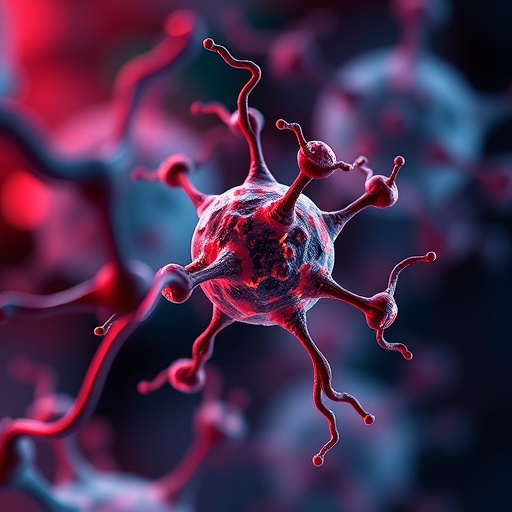In a groundbreaking exploration of the intricate relationships between metabolism, cancer, and the immune system, researchers have turned their focus towards glucose metabolism. In their article, the authors delve into how glucose not only serves as a critical source of energy for cellular functions but also plays a pivotal role in cancer progression and immune regulation. The findings discussed provide a rich tapestry of insights that could pave the way for novel therapeutic strategies aimed at metabolic targeting.
Glucose metabolism has long been understood as a fundamental biological process, essential for the energy production required by cells. However, its direct implications in cancer biology have captured scientific attention, revealing a duality where glucose fuels cancer cells’ growth while simultaneously engaging with immune pathways. This intersection of metabolism and immunology presents unique challenges and opportunities for researchers aiming to develop precise interventions that could disrupt cancer progression.
One of the most revealing aspects of glucose metabolism in cancer is the phenomenon known as the Warburg effect, where cancer cells preferentially utilize aerobic glycolysis even in the presence of oxygen. This leads to the production of lactate, even when oxidative phosphorylation could yield more energy. It is suggested that this metabolic shift helps cancer cells thrive in a low-oxygen environment, aiding in their proliferation and survival. Understanding this mechanism is crucial, as it provides insights into potential metabolic vulnerabilities that could be targeted in therapeutic approaches.
The immune system’s interaction with cancerous cells is another layer of complexity in this research domain. Cancer cells manipulate glucose metabolism not only to fuel their own growth but also to evade the immune system. For instance, elevated lactate levels can lead to an immunosuppressive tumor microenvironment. By understanding these interactions, researchers can devise strategies to bolster immune responses against tumors while simultaneously inhibiting the cancer cells’ metabolic advantages.
Emerging strategies in targeting glucose metabolism for cancer treatment are gaining traction. By employing drugs that inhibit specific enzymes involved in glycolysis, researchers hope to starve cancer cells of their energy supply. These metabolic inhibitors could potentially be used in conjunction with immunotherapies, creating a synergistic effect that enhances anti-tumor activity while reducing harmful side effects. This dual approach represents a promising frontier in oncology, emphasizing the need for more nuanced treatment regimens that account for both metabolic and immunological factors.
Moreover, the authors highlight that personalized medicine could significantly benefit from advances in understanding glucose metabolism’s role in cancer. Different tumors may exhibit varying metabolic profiles based on their genetic make-up and microenvironment. By tailoring therapies to individual metabolic signatures, oncologists could improve treatment efficacy and patient outcomes. This level of precision represents a significant leap forward in cancer care, moving away from one-size-fits-all approaches.
In their study, the authors also explore alternative fuels that tumors may utilize when glucose is limited. Some tumors can switch to utilizing ketone bodies or fatty acids, demonstrating remarkable metabolic flexibility. This adaptability complicates treatment strategies, as targeted inhibition of glucose metabolism may inadvertently drive tumors to rely more heavily on alternative energy sources. Researchers are tasked with identifying these metabolic pathways and developing strategies to block them effectively.
Furthermore, the connection between glucose metabolism and inflammatory pathways in cancer presents another avenue for exploration. Chronic inflammation is a recognized hallmark of cancer, and it is closely linked with metabolic processes. The intersection of these pathways could offer insights into how interventions aimed at metabolic reprogramming could also exert anti-inflammatory effects, potentially reducing tumor-driven inflammation and boosting immune responses.
The research community faces diverse challenges in translating these findings into clinical practice. One key hurdle is effectively delivering metabolic inhibitors to tumor sites while minimizing impact on normal tissues. Developing targeted delivery systems and combining metabolic inhibitors with traditional chemotherapies and immunotherapies could enhance effectiveness while reducing toxicity.
Additionally, the long-term effects of manipulating glucose metabolism in cancer patients remain to be fully understood. Researchers must consider the potential for developing resistance to metabolic therapies or unanticipated side effects arising from prolonged treatment. Ongoing clinical trials and patient monitoring will be essential to elucidate the safety and efficacy of these novel approaches.
As these scientific investigations continue to unfold, the promise of metabolic targeting in cancer treatment shines brighter than ever. By unraveling the complex relationship between glucose metabolism, cancer biology, and immune regulation, researchers are not only expanding our understanding of cancer but also paving the way for innovative therapeutic interventions. The potential to combine metabolic and immunological therapies could revolutionize cancer treatment, giving hope to patients who have long battled this formidable disease.
In conclusion, the work presented by the authors underscores the urgency and importance of metabolism-centered research in the field of oncology. Their findings pose critical questions regarding the role of glucose in cancer and immunity, urging both researchers and clinicians to rethink traditional paradigms of cancer treatment. As we journey into this new era of targeted therapies, the quest to decode the intricate webs of metabolism and immunology continues to offer exciting possibilities for transforming cancer care.
Subject of Research: The role of glucose metabolism in cancer progression and immune regulation.
Article Title: Glucose metabolism and its direct action in cancer and immune regulation: opportunities and challenges for metabolic targeting.
Article References:
Pan, BS., Hsu, CC., Wu, HE. et al. Glucose metabolism and its direct action in cancer and immune regulation: opportunities and challenges for metabolic targeting.
J Biomed Sci 32, 71 (2025). https://doi.org/10.1186/s12929-025-01167-1
Image Credits: AI Generated
DOI: 10.1186/s12929-025-01167-1
Keywords: glucose metabolism, cancer, immune regulation, metabolic targeting, Warburg effect, personalized medicine, metabolic inhibitors, tumor microenvironment, chronic inflammation.




